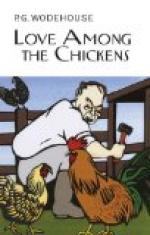“But the time is not yet ripe. He may be said at present to be simmering down.”
“I see. Thanks. Good-bye.”
“So long.”
And Mr. Chase walked on with long strides to the Cob.
The days passed slowly. I saw nothing more of Phyllis or her sister. The professor I met once or twice on the links. I had taken earnestly to golf in this time of stress. Golf is the game of disappointed lovers. On the other hand, it does not follow that because a man is a failure as a lover he will be any good at all on the links. My game was distinctly poor at first. But a round or two put me back into my proper form, which is fair.
The professor’s demeanour at these accidental meetings on the links was a faithful reproduction of his attitude on the beach. Only by a studied imitation of the Absolute Stranger did he show that he had observed my presence.
Once or twice, after dinner, when Ukridge was smoking one of his special cigars while Mrs. Ukridge nursed Edwin (now moving in society once more, and in his right mind), I lit my pipe and walked out across the fields through the cool summer night till I came to the hedge that shut off the Derrick’s grounds. Not the hedge through which I had made my first entrance, but another, lower, and nearer the house. Standing there under the shade of a tree I could see the lighted windows of the drawing-room. Generally there was music inside, and, the windows being opened on account of the warmth of the night, I was able to make myself a little more miserable by hearing Phyllis sing. It deepened the feeling of banishment.
I shall never forget those furtive visits. The intense stillness of the night, broken by an occasional rustling in the grass or the hedge; the smell of the flowers in the garden beyond; the distant drone of the sea.
“God makes sech nights, all white
and still,
Fur’z you to look
and listen.”
Another day had generally begun before I moved from my hiding-place, and started for home, surprised to find my limbs stiff and my clothes bathed with dew.
CHAPTER X
I ENLIST THE SERVICES OF A MINION
It would be interesting to know to what extent the work of authors is influenced by their private affairs. If life is flowing smoothly, are the novels they write in that period of content coloured with optimism? And if things are running crosswise, do they work off the resultant gloom on their faithful public? If, for instance, Mr. W. W. Jacobs had toothache, would he write like Hugh Walpole? If Maxim Gorky were invited to lunch by Trotsky, to meet Lenin, would he sit down and dash off a trifle in the vein of Stephen Leacock? Probably the eminent have the power of detaching their writing self from their living, work-a-day self; but, for my own part, the frame of mind in which I now found myself had a disastrous




